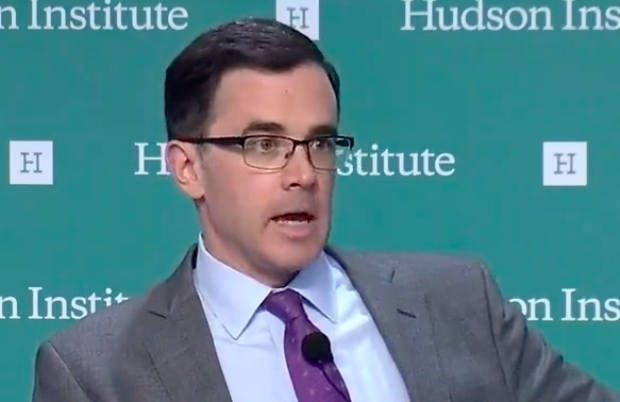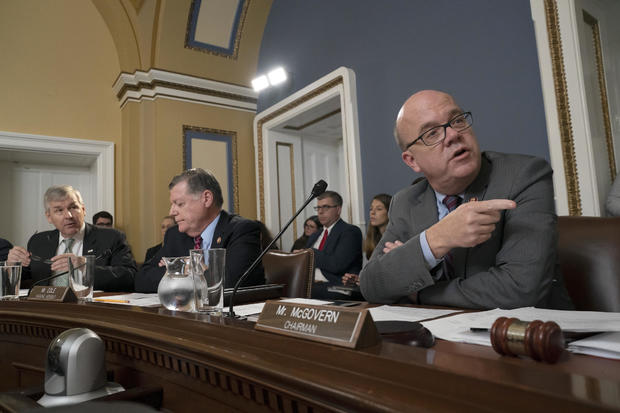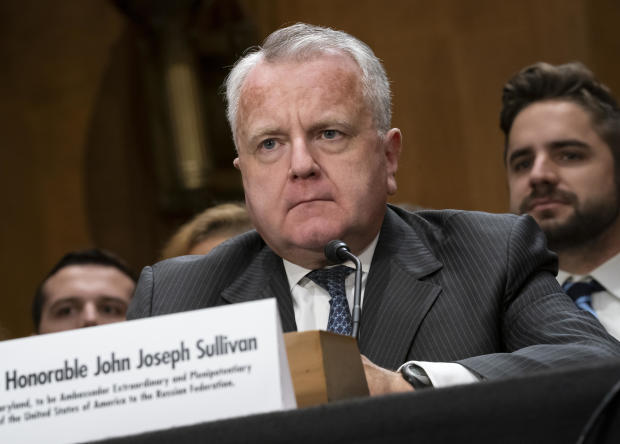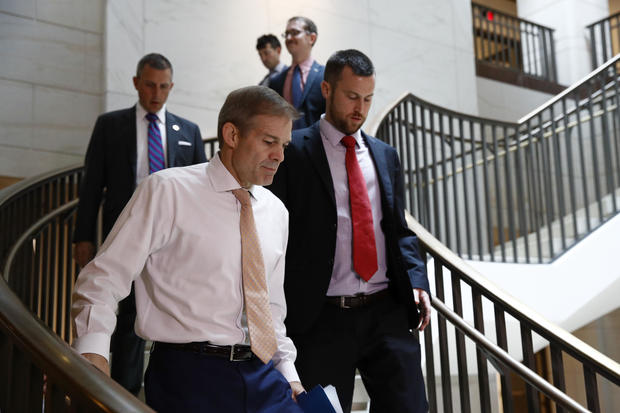The latest news on the impeachment inquiry
- House Democrats have asked former national security adviser John Bolton, who is said to have opposed external efforts to pressure Ukraine, to appear before the impeachment committee.
- Tim Morrison, a key witness in the Ukraine matter, is leaving his White House post ahead of his testimony Thursday.
- The House Rules Committee debated a resolution that establishes the procedures for public hearings in the impeachment inquiry. The full House will vote on the measure on Thursday.
- On the July 25 call between Mr. Trump and Ukrainian President Volodymyr Zelensky, Mr. Trump urged Ukraine to investigate Joe Biden.
Washington— Democrats leading the impeachment investigation summoned former national security adviser John Bolton to appear before the committees leading the probe, in addition to two White House lawyers involved in the Ukraine affair, according to a person familiar with the investigation.
Other witnesses have testified that Bolton was furious over efforts by Rudy Giuliani and others to pressure Ukraine, at one point calling the demand for investigations a “drug deal.” He resigned from the White House in September before the impeachment inquiry. It was not immediately clear whether he intends to appear before lawmakers.
A source familiar with Bolton’s plans told CBS News he “won’t appear without a subpoena.” Bolton’s attorney, Charles Cooper, told CBS News’ Paula Reid, “Bolton is not willing to appear voluntarily but I stand ready at all times to accept service of a subpoena on his behalf.”
A key witness scheduled to testify on Thursday is leaving his post at the White House, administration officials said Wednesday evening. Tim Morrison, a Russia expert at the National Security Council, is stepping down. He is scheduled to testify Thursday morning.
The House Rules Committee met on Capitol Hill to “mark up” a resolution unveiled by Democrats on Tuesday that establishes protocols for the next phase of the impeachment inquiry. Democratic leaders say they plan to bring it to a full House vote on Thursday.
The measure as currently written directs “certain committees to continue their ongoing investigations as part of the existing House of Representatives inquiry into whether sufficient grounds exist for the House of Representatives to exercise its Constitutional power to impeach Donald John Trump, President of the United States of America, and for other purposes.”
It sets the parameters for public hearings led by the House Intelligence Committee, which will craft a report to the Judiciary Committee. That report will form the basis for proceedings in Judiciary, where the president and his counsel will be allowed to cross examine witnesses and request testimony. The Judiciary Committee will decide whether to adopt articles of impeachment to send to the full House.
The White House rejected the resolution and said it shows the inquiry “has been an illegitimate sham from the start.” Top GOP leaders in the House wrote a letter to the chairman of the Rules Committee on Tuesday, accusing Democrats of flouting House rules by failing to post the text of the resolution 72 hours before a vote.
Horn and Golden both say they will support impeachment inquiry resolution
Congresswoman Kendra Horn, who flipped a pro-Trump district in Oklahoma City in 2018, told The Oklahoman that she will vote for the impeachment inquiry resolution.
“A transparent, public process is a move out of the closed-door hearings that gives everybody the same rules,” the Democrat said in an interview. “This is not saying I have made a determination [about impeachment] or not. But for me, it is about ensuring that our systems work.”
Horn’s support came just hours after Congressman Jared Golden of Maine said he would vote for Thursday’s impeachment inquiry resolution.
With Horn and Golden’s support, there are only three Democrats who have not publicly expressed support for the resolution.
Those three Democrats are: Anthony Brindisi of upstate New York, Jeff Van Drew of southern New Jersey and Collin Peterson of western Minnesota.
Key witness in Ukraine investigation leaving White House
6:12 p.m.: A White House official who has emerged as a central witness in the Ukraine scandal is leaving his post, senior administration officials tell CBS News.
Tim Morrison, the senior director of European and Russian affairs at the National Security Council, is scheduled to testify before the House committees leading the impeachment inquiry on Thursday.
Morrison’s departure was first reported by NPR. An official said the departure has been in the works “for some time” and that he is leaving of his own accord.
“After more than a year of service at the National Security Council, Mr. Morrison has decided to pursue other opportunities — and has been considering doing so for some time,” the official said. “We wish him well.”
Morrison’s testimony on Thursday is highly anticipated, as he was repeatedly mentioned by Bill Taylor, the top U.S. diplomat in Kiev, during a closed-door interview with the committees last week. — Grace Segers
Read the full story here.
Democrats schedule testimony for Bolton and White House lawyers
3:48 p.m.: House Democrats have set dates for appearances by two figures at the center of the impeachment inquiry: former national security adviser John Bolton and top White House lawyer John Eisenberg, according to a source familiar with the investigation. Michael Ellis, a special assistant to the president and Eisenberg’s deputy, was also summoned to testify.
Other witnesses have testified that Bolton was furious over efforts by Rudy Giuliani and others to pressure Ukraine, at one point calling the demand for investigations a “drug deal.” Eisenberg, a deputy assistant to the president and National Security Council legal adviser, ordered a summary of the president’s July 25 call with the president of Ukraine moved to more secure server, severely restricting who could access it.
Bolton’s interview before the committees is set for November 7, and Eisenberg and Ellis were both told to appear on November 4. Bolton resigned as national security adviser in September before the whistleblower complaint became public. — Olivia Gazis and Rebecca Kaplan
House Rules Committee debates impeachment resolution
3:30 p.m.: Members of the House Rules Committee are meeting to “mark up” the proposed resolution before bringing it to the full House for a vote on Thursday. Watch a live stream of the hearing here.
Gaetz files ethics complaint against Schiff
1:58 p.m.: Republican Congressman Matt Gaetz is filing a formal ethics complaint against Congressman Adam Schiff, the chairman of the House Intelligence Committee, over what he calls Schiff’s “unconstitutional and secret handling” of the impeachment inquiry.
“Chairman Schiff has abused his authority and seems to believe that the rules of the House of Representatives do not apply to him,” Gaetz said. “We cannot have a multi-tiered justice system in the United States or in the Congress. His egregious behavior must change immediately.”
Gaetz’s action comes a week after he led a group of Republicans into the secure room where closed hearings were being held by the committees conducting the impeachment inquiry to protest the proceedings. — Grace Segers
McConnell says Democrats setting “a new low” on impeachment
12:53 p.m.: Senate Majority Leader Mitch McConnell denounced House Democrats earlier on the Senate floor, criticizing them for denying the president “basic due process rights” in their upcoming resolution.
“Any such inquiry must be conducted by the highest standards of fairness and due process, but thus far this time around instead of setting a high bar, House Democrats seem determined to set a new low,” McConnell said. “‘No due process now, maybe some later, but only if we feel like it’ is not a standard that should ever be applied to any American and it should not be applied here to the president of the United States.” — John Nolen
John Sullivan questioned by lawmakers about ouster of U.S. ambassador to Ukraine
11:28 a.m. At Deputy Secretary of State John Sullivan’s confirmation hearing to succeed Jon Huntsman as U.S. ambassador to Russia, he was asked a series of pointed questions by the ranking member of the Senate Foreign Relations Committee, Senator Bob Menendez.
The New Jersey senator asked Sullivan about his role in the recall of former U.S. Ambassador Marie Yovanovitch. Sullivan was the State Department official who informed Yovanovitch that she was being recalled from Ukraine early.
Sullivan said he believed Yovanovitch served the country admirably, and he personally did not think she had done anything wrong. He said he asked Secretary of State Mike Pompeo why she was being recalled, and Pompeo simply told him the president had lost confidence in her.
Menendez asked if Sullivan had asked Pompeo why the president had lost confidence, and Sullivan said he had, but he was given no explanation.
Menendez asked why he didn’t push back, and Sullivan replied there had been an ongoing conversation for months and Pompeo had pushed back, but at the end of the day, if a president has lost confidence in an ambassador for any reason — “right or wrong” — the ambassador has to come home.
Menendez asked Sullivan if he had been aware of the Giuliani-led smearing of Yovanovitch. Sullivan said he did, and called it a “campaign against the ambassador to Ukraine.”
The testimony is notable because most of the interviews with knowledgeable individuals have taken place behind closed doors. This hearing, which will go on for several more hours, gives the public a rare public opportunity to hear from an individual who was directly involved in the controversy. — Nancy Cordes
Catherine Croft appearing under subpoena
10:47 a.m.: State Department official Catherine Croft is appearing before the House committees conducting the impeachment inquiry under subpoena, an official working on the impeachment inquiry told CBS News.
“In light of an attempt by the White House and State Department to direct Catherine Croft not to appear for her scheduled deposition, and efforts to also limit any testimony that does occur, the House Intelligence Committee issued a subpoena to compel her testimony this morning. As is required of her, Ms. Croft is now complying with the subpoena and answering questions from both Democratic and Republican Members and staff,” the official said. — Rebecca Kaplan
State Department official says Bolton warned of Giuliani’s influence on Ukraine
9:41 a.m.: Christopher Anderson, a career foreign service officer in the State Department, will testify that former national security adviser John Bolton believed Rudy Giuliani was an obstacle in increasing cooperation between the White House and Ukraine. Giuliani is Mr. Trump’s personal attorney.
According to his opening statement, which was obtained by CBS News, Anderson will say that Bolton “cautioned that Mr. Giuliani was a key voice with the President on Ukraine which could be an obstacle to increased White House engagement” in a June 13 meeting.
Anderson’s attorney, Mark MacDougall, will testify the White House told Anderson he could not participate in the impeachment inquiry, but Anderson is appearing because he was served with a valid subpoena. MacDougall will also say Anderson is not the whistleblower whose complaint kicked off the impeachment inquiry. — Grace Segers
State official testifies on pressure to oust Yovanovitch
9:00 a.m. Catherine Croft, the State Department employee who worked on Ukraine issues at the National Security Council and then for special envoy to Ukraine Kurt Volker, wrote in her testimony to Congress that she had received numerous calls to oust Ukraine Ambassador Marie Yovanovitch from lobbyist Robert Livingston. According to Croft, Livingston frequently referred to Yovanovitch as an “Obama holdover” and associated with George Soros.
Livingston is a former Republican congressman who abruptly resigned as Republicans were preparing to impeach President Clinton due to a scandal over an extramarital affair.
“It was not clear to me at the time — or now — at whose direction or at whose expense Mr. Livingston was seeking the removal of Ambassador Yovanovitch. I documented these calls and told my boss, Fiona Hill, and George Kent, who was in Kyiv at the time. I am not aware of any action that was taken in response,” Croft wrote in her testimony.
Croft also wrote in her testimony that she participated in a meeting prior to President Trump’s July 25 call where an OMB official reported that Mick Mulvaney had placed “an informal hold on security assistance to Ukraine. The only reason given was that the order came at the direction of the President.”
Croft arrived for her deposition at the Capitol at approximately 8:48 a.m. — Emily Tillett and Grace Segers
Monday, October 29
Rules Committee lays out president’s rights in Judiciary proceedings
6:18 p.m.: The House Rules Committee released additional proposed procedures for the Judiciary Committee’s phase of the inquiry. The additional guidelines elaborate on the due process rights afforded to the president and his counsel.
Under the Rules Committee procedures, the counsel for the majority and minority of the other committees involved in the impeachment inquiry would provide a report and records to the Judiciary Committee, which would be made available to the president’s counsel, who would also be allowed to be present for hearings by the committee counsel and ask questions.
The president and his counsel would also be permitted to attend all hearings once witnesses are called and would be able to object to evidence and testimony, with Schiff judging the merits of the objection. Schiff’s decision could be overruled by a majority of members.
The president’s counsel also “may question any witness called before the Committee, subject to instructions from the chair or presiding member respecting the time, scope and duration of the examination.”
The Rules Committee document also includes an implicit warning to the president and his legal team.
“Should the President unlawfully refuse to make witnesses available for testimony to, or to produce documents requested by, the investigative committees … the chair shall have the discretion to impose appropriate remedies, including by denying specific requests by the President or his counsel under these procedures to call or question witnesses,” the text says. — Stefan Becket
White House reacts to resolution, calling inquiry a “sham”
5:28 p.m.: White House press secretary Stephanie Grisham said the Democratic resolution on the impeachment inquiry “confirms that House Democrats’ impeachment has been an illegitimate sham from the start as it lacked any proper authorization by a House vote.”
Grisham said the resolution “continues this scam by allowing Chairman Schiff, who repeatedly lies to the American people, to hold a new round of hearings, still without any due process for the President.”
She added that the resolution “does nothing to change the fundamental fact that House Democrats refuse to provide basic due process rights to the Administration.” — Stefan Becket
What’s in Democrats’ impeachment resolution?
3:55 p.m.: The resolution directs the Intelligence Committee, led by Chairman Adam Schiff, to hold open hearings in the investigation, with equal time for questioning allotted to majority and minority members of the committee or staff. Both the chairman and the ranking member, or designated staff members, would have 45 minutes to question witnesses in 5-minute increments before questioning by other members.
The resolution also gives the top Republican on the committee, ranking member Devin Nunes, the ability to submit requests for witnesses with “a detailed written justification of the relevance of the testimony” by each witness. Schiff would be able to decline Nunes’ request, with Nunes able to refer the request to the full committee for a vote. The resolution also gives Nunes the authority to issue subpoenas to compel testimony from his witnesses, and Schiff the authority to release transcripts of closed-door depositions.
The Intelligence Committee would then draft a report of its findings in consultation with the chairs of Foreign Affairs and Oversight, and transmit the report to the Judiciary Committee, as well as relevant investigatory material the committee collected. — Stefan Becket
Read more here.
Jordan, Scalise deny they are trying to root out the whistleblower’s identity
3:29 p.m.: Speaking to reporters outside the SCIF, House Minority Whip Steve Scalise and Congressman Jim Jordan condemned Schiff for blocking Vindman from answering questions about who he spoke with after the July 25 call.
Democrats argue Republicans are trying to figure out the identity of the whistleblower through a process of elimination by asking Vindman with whom he spoke about the call. However, Scalise and Jordan argued that they’re simply trying to come up with a list of witnesses to call.
Scalise called the impeachment inquiry hearings a “Soviet-style process.” — Grace Segers
Democrat explains why he won’t vote for impeachment resolution
2:36 p.m.: Congressman Jeff Van Drew, one of the few Democrats who still opposes the impeachment inquiry, told CBS News he “can’t imagine” supporting the impeachment resolution slated for a vote on Thursday.
“Obviously he’s going to be impeached here, and it will go to the Senate. I believe that in the Senate, he will be vindicated. So we will have the same president and the same candidate who has now been vindicated,” Van Drew explained. “I’m not sure that’s what everybody wants as a result … And I also think we’ve spent a lot of money and a lot of time and haven’t been able to get a lot of things done.” — Grace Segers
Jordan says Schiff told Vindman not to answer question from GOP counsel
1:56 p.m.: GOP Congressman Jim Jordan, the ranking member on the House Oversight Committee, told reporters that House Intelligence Committee Chairman Adam Schiff instructed Vindman not to answer a question directed to him by the Republican staff counsel.
“He’s under subpoena. He’s supposed to answer the questions we have during our hour, and Chairman Schiff instructed him not to answer those questions,” Jordan said.
“This is just, you know, continuation of Adam Schiff’s games and the idea that during our hour, our counsel’s asking questions and Adam Schiff tells the witness not to answer is completely ridiculous and it’s why it should be in public,” Jordan continued.
Schiff did not answer any questions from reporters as he left the SCIF to go to a vote. — Grace Segers
Republicans accuse Democrats of breaking House rules with resolution
1:20 p.m.: Representatives Jim Jordan, Michael McCaul and Devin Nunes — the top Republicans on the House Oversight, Foreign Affairs and Intelligence Committees — have written a letter to House Rules Committee Chairman James McGovern, accusing him of breaking House rules to push through a resolution outlining the next steps in the impeachment inquiry.
Jordan, McCaul and Nunes wrote that the resolution text has not been posted 72 hours ahead of time, as is required by House rules, and that there has been no legislative hearing on the matter.
“While we strongly believe this impeachment inquiry should be transparent, we are disappointed that Democrats are now rushing and breaking House rules in an attempt to retroactively legitimize their illegitimate impeachment inquiry,” they wrote.
Now that Democrats have announced their plans to establish procedures for public hearings and the next phase of the inquiry, Republicans who had been calling for such a vote have argued that the process up until this point has been unfair and illegitimate and therefore they will not support the resolution.
“At the beginning of this Congress, you said ‘I want my legacy to be that I was fair. We didn’t rig the process and we moved good things forward.’ The Democrats’ entire impeachment process is fundamentally unfair. It is rigged,” the top Republicans’ letter reads. “The American people see through this partisan charade. No matter how hard you try to legitimize this sham impeachment inquiry, it cannot hide the Democrats’ goal of relitigating the results of the 2016 presidential election.” — Rebecca Kaplan
Wasserman Schultz says Vindman’s testimony “filled in more of the puzzle pieces”
1:05 p.m.: Speaking to reporters as she exited the secure hearing room, or SCIF, Democratic Congresswoman Debbie Wasserman Schultz said Vindman’s testimony “filled in more of the puzzle pieces” about the July 25 call.
“The testimony I’ve heard today continues to corroborate prior testimony. It has done nothing to undo that previous testimony and has actually filled in more of the puzzle pieces,” Wasserman Schultz said.
She also accused Republicans of using their time questioning Vindman to try to get him to reveal who the whistleblower is. Vindman said in his opening testimony that he didn’t know the identity of the whistleblower and wouldn’t feel comfortable speculating.
“Most of their hour seemed to have been spent trying to backdoor him into narrowing down, for them, who the whistleblower is,” Wasserman Schultz said.
She added that she would like to hear again from U.S. Ambassador to the E.U. Gordon Sondland, as his testimony was contradicted by Vindman and former National Security Council aide Fiona Hill.
“I’d like to hear more from him, because what I’ve subsequently heard from other witnesses causes concern about his veracity and his testimony,” she said. — Grace Segers





